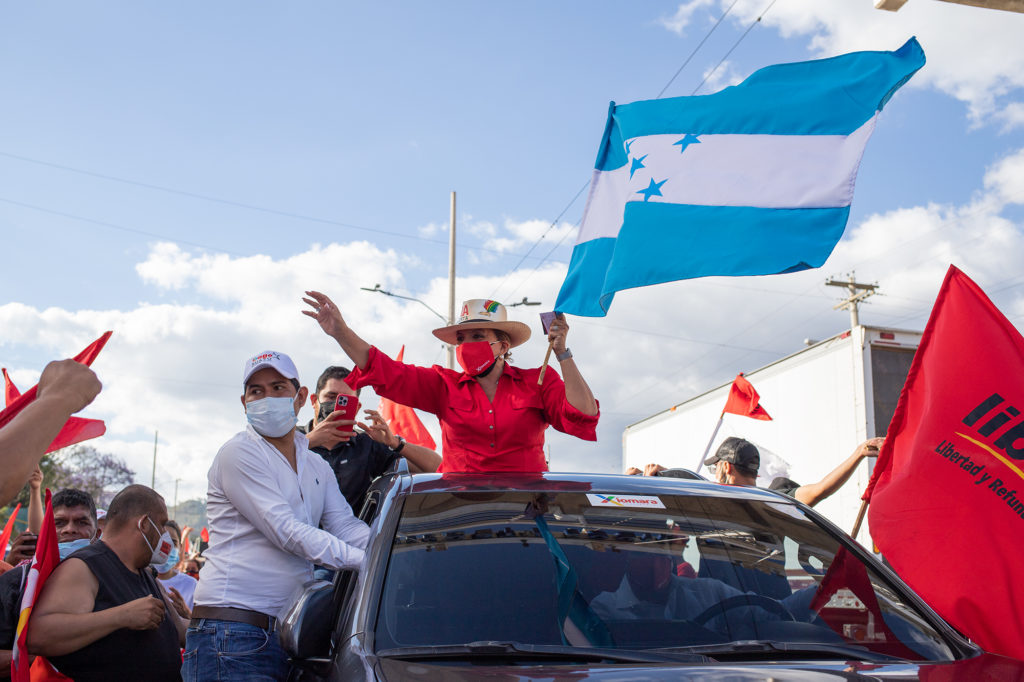By Tamara Pearson
Photo Martín Cálix
Preliminary results announced by Honduras’ National Electoral Commission (CNE) are that Xiomara Castro of the Libre Party obtained 53.44% of the votes.
These results are based on just 16% of the votes.
In second place, for president, was Nasry Asfura, with 34% of the vote.
In Sunday’s elections, voters were choosing a president, congress people, mayors, and members of the Central American Parliament. The new president serves a four-year term, and swears in at the end of January.
Issues with election day
While voting around the country was largely peaceful, there were issues at some booths. Particularly in Tegucigalpa, there were long delays in the opening of the booths combined with long lines, with people still waiting to vote as the booths were due to close. All indications were that despite the fear, violence, and uncertainty, turn out was relatively high.
According to the CNE, 62% of eligible citizens voted – a historic figure.
At around 10am local time – and only a few hours into voting, David Chavez, National Party candidate for the Central District, said 14 of 18 departments had been won by his party.
Then at around 1pm, the National Party again claimed victory, via a press conference. “Honduras has a new president-elect; Papi,” they said, using the nickname for presidential candidate Nasry Asfura. This sort of tactic had the potential of turning people off from voting, and confusing people about the real results.
At 6:30 pm, two hours before official preliminary results were due, the Libre Party announced its victory, and the first female president of Honduras. Exit polls supported the announcement.
Lucia Vijil of the CESPAD (Center for Democracy Studies) said she observed “political patronage,” with public resources being used at voting centres for paying for food in exchange for votes.
As a booth observer, she said, “We were told straight away that we were there for the National Party, when our job is to verify. We’re not National Party activists, nor anything like it. We have human rights defenders performing observation work.”
Witness for Peace observed various irregularities, including regarding the use of voting technology, booths without the necessary technology (or it arrived late), and vote buying.
The National Electoral Council (CNE) site, which voters use to find their booth locations, had been down most of the day. The CNE later made a statement denouncing an attack on its web server. It also said that one of its staff was attacked. The council called on parties not to provide fake election results.
Important elections
The elections were held in a tense climate of fear. There was a strong hate campaign waged against the Libre Party, associating its main candidate with communism, Venezuela and Cuba, and abortion rights. Fraud allegations marred the 2017 presidential elections, leading to mass protests, and many Hondurans may have feared a repeat.
The conservative National Party had been in power for 12 years, following a US-backed coup against the left wing Libre Party in 2009. The National Party deepened corruption, increased militarization, and some of its members were allegedly involved in drug trafficking. It’s presidential candidate, Asfura is facing an investigation within Honduras for alleged embezzlement while he was mayor of Tegucigalpa.
Xiomara Castro, of the Libre Party, is married to Manual Zelaya, ousted in the 2009 coup. This was her third time running as the presidential candidate. Zelaya’s presidency brought noticeable changes to Honduras, and people voting today were hoping that Castro would also help the country.
To gain the necessary votes, her party made an alliance with former TV host Salvador Nasralla. Castro has run on a social program platform, and has promised to decriminalize abortion in three situations, as well as to ban the corporate economic zones.
Understand more: Pre-election political violence roils Hondurans






